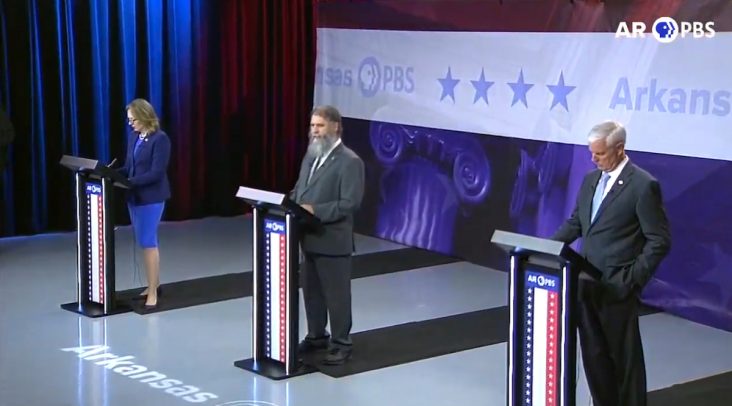Deficits, COVID-19, healthcare key topics of 3rd Congressional District debate
by October 13, 2020 5:27 pm 554 views

(from left) Democrat Celeste Williams, Libertarian Michael Kalagias, and U.S. Rep. Steve Womack, R-Rogers
U.S. Rep. Steve Womack, R-Rogers, said he best knows the issues facing the 3rd Congressional District. Democrat challenger Celeste Williams said Womack has done nothing meaningful during his 10 years in Congress. Libertarian candidate Michael Kalagias said voters shouldn’t look to Republicans or Democrats to make things better.
Such was the overall theme of the 3rd Congressional debate conducted Tuesday afternoon (Oct. 13) by Arkansas PBS.
Williams, in her opening remarks, said that as a nurse and working mother of four she is not the traditional Congressional candidate, and said people of the district deserve someone in Congress who knows that truth and science is “neither liberal or conservative.” Womack said in his opening remarks that the 2020 election is important because voters have a choice between a government that is too large or a limited government that “pushes issues down to the states.”
Kalagias said Democrats and Republicans are responsible for big government and deficit spending that has created a growing debt for all Americans.
“The moment every American is conceived, they owe a debt to the United States government of over $82,000 each. I want you to think about that,” he said, adding that choosing between Democrats and Republicans has meant “the same result has been the same bad government.”
Womack responded later in the debate by saying deficits are the result of too much spending and not because of tax cuts. He said tax cuts boosted the economy and helped some of the lowest earners in the country. Womack said addressing deficits will require tough decisions about Social Security, Medicare and other entitlement programs.
Williams and Kalagias argued that Womack has had 10 years in Congress to prove he’s committed to deficit reduction, with Williams noting the Womack’s only action is to push a commemorative coin bill. Kalagias was more pointed.
“He’s been terrible at it [deficit reduction],” Kalagias said, but added that sending a Democrat to Congress won’t be any better.
COVID, ECONOMIC STIMULUS
On the COVID-19 pandemic, Womack said the virus “did not come with a playbook.” He said it has had a bigger impact on minorities often because they “live in very close proximity” and that makes the situation worse. He also said it took time for employers in which many minorities work to create safe socially distanced workplaces.
Williams disagreed, saying the Obama Administration left a playbook the Trump Administration ignored. She said an historic lack of access to education and healthcare resources resulted in minorities being more impacted by COVID, adding that the country should be capable of simultaneously addressing the economy and the pandemic.
Kalagias, sticking to his theme, said COVID is bad because of decades of bad government from both parties. He said government agencies have also been inept with bad data making it impossible to know if the country has 2,000 COVID deaths or more than 200,000.
As for a stimulus, Williams said a follow-up to the CARES Act must ensure that relief gets to citizens and is not simply a corporate bailout. The estimated $2.2 trillion Coronavirus Aid, Relief, and Economic Security (CARES) Act was approved by Congress earlier this year to provide aid to individuals, businesses and state and local governments in response to the pandemic. She also said the next package should include more money to address the pandemic through testing, tracing, isolating and other measures.
Kalagias opposed another stimulus round, saying such federal aid is “stealing” from future generations who have to repay the debt. Womack, who voted for the CARES Act, said another stimulus package can’t include “flawed policies” like unemployment benefit increases that “put a moral dilemma” on workers who become incentivized to not go back to work. However, a Federal Reserve Bank of San Francisco study, published Sept. 21, found there was no moral dilemma realized because of the extra UI benefit.
“We find little to no disincentive effect from the higher benefits in the data. Our findings emphasize that UI benefits instead served as an important source of economic relief and stimulus,” the study authors noted.
CLOSING REMARKS
Williams, who was first to provide a closing, said if those in the 3rd District want better conditions – especially in protecting access to healthcare – for all in the district they need to make a change in who they send to Congress.
“Congressman Womack has had his chance. He has spent 10 years in Congress. … I think we have to have someone who will work for every single member of the 3rd Congressional District,” Williams said.
Womack said many issues were covered in the debate but noted it is important for the members of Congress to know the district. He cited his work with the complex federal consent decree facing the city of Fort Smith, efforts to bring a pilot training center to the 188th Air Guard base in Fort Smith, highway road projects in Northwest Arkansas, rural broadband and improving Veterans Affairs services as some of the reasons he is most qualified to represent the district.
“I would argue of the panelists here today, of the contestants here today, that I have the most intimate and unique knowledge of the issues affecting my constituents,” Womack said.
Kalagias picked up on Womack’s note about the VA, and challenged Womack to drop his “cadillac” insurance as a member of Congress and instead get his healthcare through the VA. Kalagias said he is a veteran who receives services through the VA and they have not improved during Womack’s tenure in Congress.
“I feel bad for all those Veterans that are stuck with just that as their healthcare. Government rationing of healthcare does not work very well. … Mr. Womack’s been in office for 10 years, and he hasn’t done anything to make it any better,” Kalagias said.
